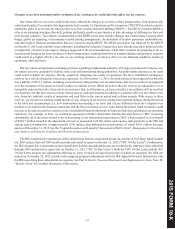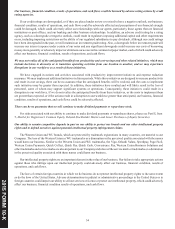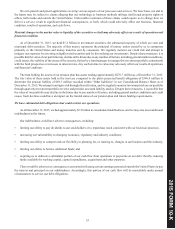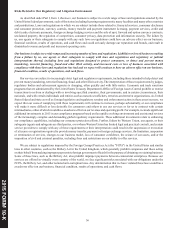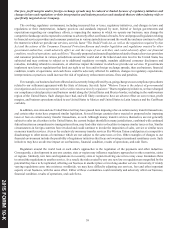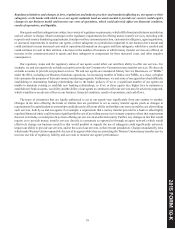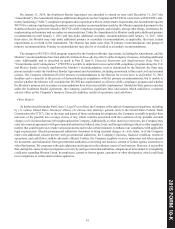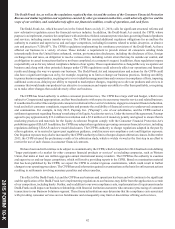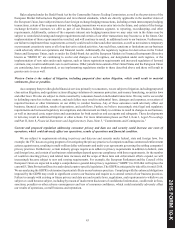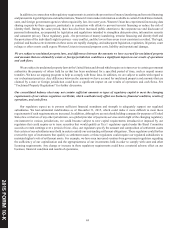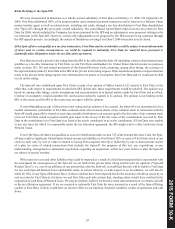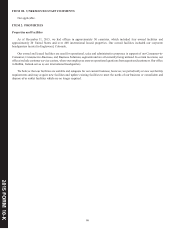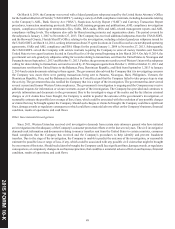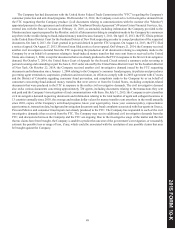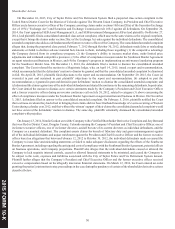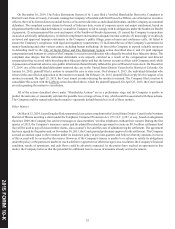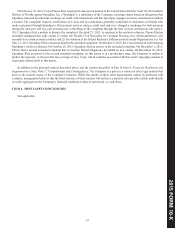Western Union 2015 Annual Report Download - page 145
Download and view the complete annual report
Please find page 145 of the 2015 Western Union annual report below. You can navigate through the pages in the report by either clicking on the pages listed below, or by using the keyword search tool below to find specific information within the annual report.
43
Rules adopted under the Dodd-Frank Act by the Commodity Futures Trading Commission, as well as the provisions of the
European Market Infrastructure Regulation and its technical standards, which are directly applicable in the member states of
the European Union, have subjected most of our foreign exchange hedging transactions, including certain intercompany hedging
transactions, certain of the corporate interest rate hedging transactions we may enter into in the future, and certain of the foreign
exchange derivative contracts we offer as part of our Business Solutions segment, to reporting, recordkeeping, and other
requirements. Additionally, certain of the corporate interest rate hedging transactions we may enter into in the future may be
subject to centralized clearing and margin requirements and certain of our other transactions may become so in the future. Our
implementation of these requirements has resulted, and will continue to result, in additional costs to our business. Furthermore,
our failure to implement these requirements correctly could result in fines and other sanctions, as well as necessitate a temporary
or permanent cessation to some or all of our derivative related activities. Any such fines, sanctions or limitations on our business
could adversely affect our operations and financial results. Additionally, the regulatory regimes for derivatives in the United
States and European Union, such as under the Dodd-Frank Act and the European Markets in Financial Instruments Directive
known as "MiFID II," are continuing to evolve and changes to such regimes, our designation under such regimes, or the
implementation of new rules under such regimes, such as future registration requirements and increased regulation of forward
contracts, may result in additional costs to our business. Other jurisdictions outside of the United States and the European Union
are considering, have implemented, or are implementing regulations similar to those described above and these will result in
greater costs to us as well.
Western Union is the subject of litigation, including purported class action litigation, which could result in material
settlements, fines or penalties.
As a company that provides global financial services primarily to consumers, we are subject to litigation, including purported
class action litigation, and regulatory actions alleging violations of consumer protection, anti-money laundering, securities laws
and other laws. We also are subject to claims asserted by consumers based on individual transactions. We may not be successful
in defending ourselves in these matters, and such failure may result in substantial fines, damages and expenses, revocation of
required licenses or other limitations on our ability to conduct business. Any of these outcomes could adversely affect our
business, financial condition, results of operations, and cash flows. Further, we believe increasingly strict legal and regulatory
requirements and increased regulatory investigations and enforcement are likely to continue to result in changes to our business,
as well as increased costs, supervision and examination for both ourselves and our agents and subagents. These developments
in turn may result in additional litigation or other actions. For more information please see Part I, Item 3, Legal Proceedings
and Part II, Item 8, Financial Statements and Supplementary Data, Note 5, "Commitments and Contingencies."
Current and proposed regulation addressing consumer privacy and data use and security could increase our costs of
operations, which could adversely affect our operations, results of operations and financial condition.
We are subject to requirements relating to privacy and data use and security under federal, state and foreign laws. For
example, the FTC has an on-going program of investigating the privacy practices of companies and has commenced enforcement
actions against many, resulting in multi-million dollar settlements and multi-year agreements governing the settling companies'
privacy practices. Furthermore, certain industry groups require us to adhere to privacy requirements in addition to federal, state
and foreign laws, and certain of our business relationships depend upon our compliance with these requirements. As the number
of countries enacting privacy and related laws increases and the scope of these laws and enforcement efforts expand, we will
increasingly become subject to new and varying requirements. For example, the European Parliament and the Council of the
European Union are expected to adopt a comprehensive general data privacy regulation (“GDPR”) in 2016 that will replace the
current EU Data Protection Directive and related country-specific legislation. The GDPR is anticipated to take effect in mid-2018.
We are analyzing the GDPR to determine its potential effects on our business practices. Complying with the enhanced obligations
imposed by the GDPR may result in significant costs to our business and require us to amend certain of our business practices.
Failure to comply with existing or future privacy and data use and security laws, regulations, and requirements to which we are
subject or could become subject, including by reason of inadvertent disclosure of confidential information, could result in fines,
sanctions, penalties or other adverse consequences and loss of consumer confidence, which could materially adversely affect
our results of operations, overall business and reputation.
201 FORM 10 K
5 -


